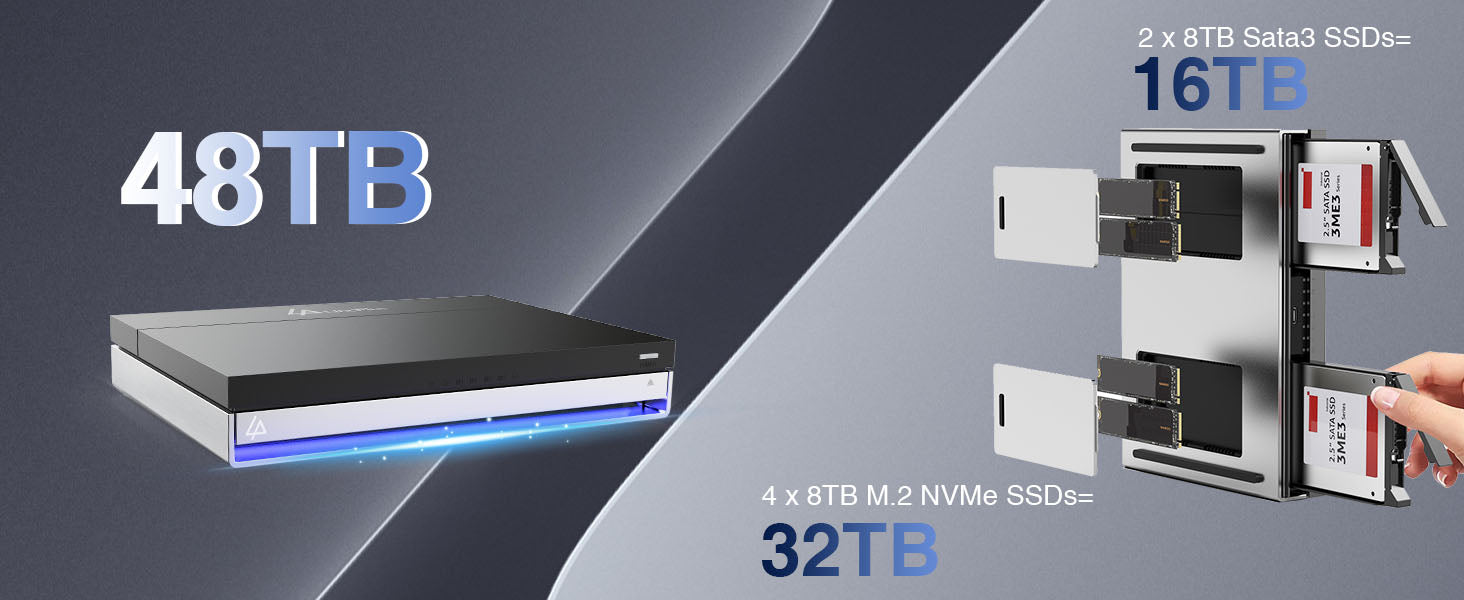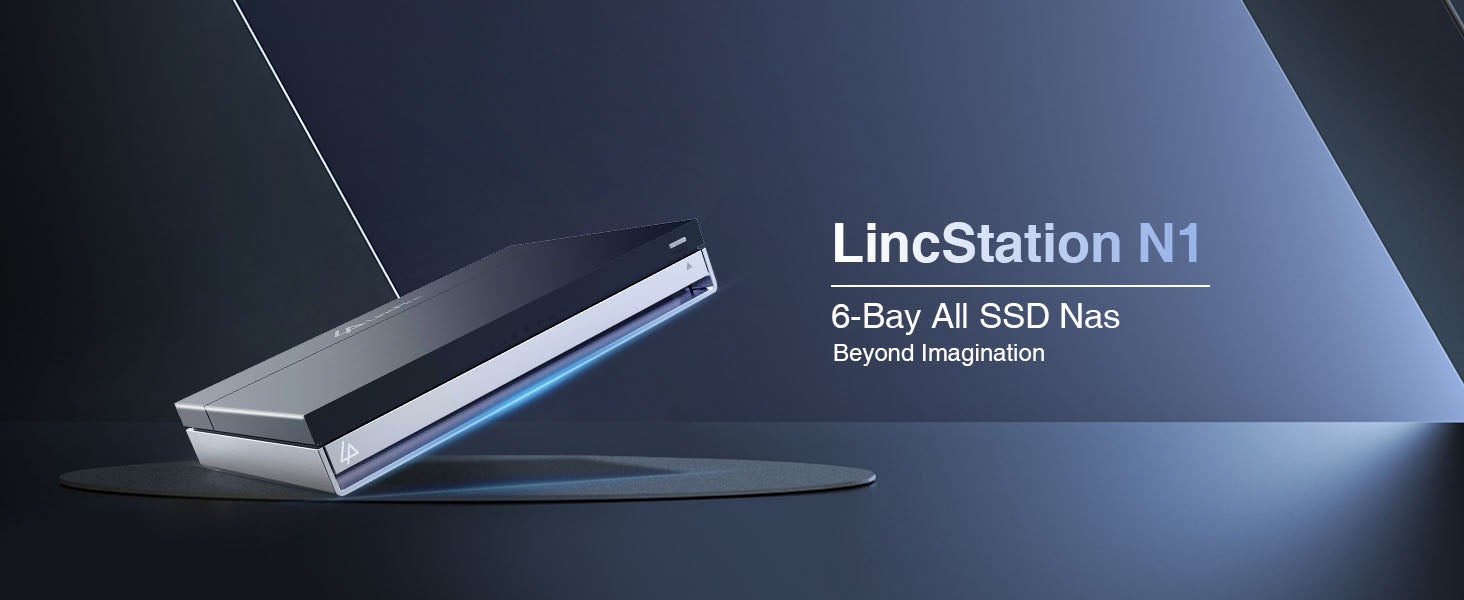Introduction
Network Attached Storage (NAS) systems have revolutionized the way data is stored and accessed, offering centralized and efficient storage solutions for both personal and professional use. As technology advances, so does the demand for faster and more efficient storage options. Enter M.2 NVMe NAS—a cutting-edge solution that leverages the speed and efficiency of NVMe technology within a compact M.2 form factor. This article delves into what M.2 NVMe NAS is, its advantages over traditional NAS systems, and why it is becoming the go-to choice for high-performance storage needs.
What is M.2 NVMe NAS
M.2 NVMe NAS refers to a NAS system that uses M.2 NVMe (Non-Volatile Memory Express) SSDs for data storage. The M.2 form factor is a specification for internally mounted computer expansion cards and associated connectors. NVMe is a high-performance, scalable host controller interface designed to address the needs of modern systems that use PCIe (Peripheral Component Interconnect Express) SSDs, offering superior speed and efficiency.
Comparison of NVMe vs. HDDs
To understand the significance of M.2 NVMe NAS, it is essential to compare NVMe SSDs with the more traditional SATA SSDs:
- Speed and Performance: NVMe SSDs provide significantly faster read/write speeds compared to HDDs. According to the IBM Blog on NVMe vs. HDD, NVMe SSDs leverage the high-speed PCIe interface, which allows for much higher data transfer rates. HDDs, on the other hand, are limited by the HDD interface's maximum speed.
- Form Factor and Interface: The M.2 form factor is smaller and more versatile compared to the 2.5-inch form factor typically used by HDDs. The Kingston Blog on M.2 vs. SSD explains that M.2 NVMe SSDs can directly connect to the motherboard, reducing cable clutter and improving airflow within the system.
- Latency and Efficiency: NVMe SSDs have lower latency and higher efficiency due to their optimized protocol for NAND flash storage. As highlighted in the Backblaze Blog on NVMe vs. M.2 Drives, NVMe's architecture allows for parallel processing of data, resulting in faster access times and better overall performance.
How M.2 NVMe NAS Differs from Traditional NAS Solutions
Traditional NAS systems typically use HDDs (Hard Disk Drives) or SATA SSDs. While these storage mediums have served well over the years, they cannot match the performance levels offered by M.2 NVMe SSDs. nvme nas server provides:
-
Higher Data Transfer Rates: Leveraging the PCIe interface, all nvme nas
can achieve much higher data transfer rates compared to traditional NAS systems. - Improved Latency: Faster access to data due to lower latency, making it ideal for applications that require real-time data processing.
- Enhanced Efficiency: Reduced power consumption and heat generation, leading to longer lifespan and reliability of the storage system.
Advantages of M.2 NVMe NAS
Performance
The most notable advantage of nvme based nas is its exceptional performance. M.2 NVMe SSDs offer significantly higher read and write speeds compared to their SATA counterparts. This means faster boot times, quicker file transfers, and more efficient data processing. For tasks that require high throughput and low latency, such as video editing, 3D rendering, and database management, nvme network storage provides the necessary speed and efficiency to handle these demanding applications seamlessly.
Efficiency
m 2 2280 nvme ssd nas are not only faster but also more efficient in terms of power consumption and heat management. They use less power than traditional HDDs and even SATA SSDs, which translates to lower operational costs and a reduced environmental footprint. Additionally, the efficient heat management of NVMe SSDs ensures that they run cooler, reducing the risk of overheating and improving the overall reliability of the storage system.
Form Factor
The M.2 form factor is significantly smaller and more versatile than the traditional 2.5-inch or 3.5-inch drives used in NAS systems. This compact design allows for greater flexibility in system design, enabling more SSDs to be fitted into a smaller space. This is particularly beneficial for environments with limited physical space, such as small office setups or home labs.
Advanced Use Cases
m 2 nvme nas enclosure is especially advantageous for advanced use cases that require high-performance storage solutions. These include:
- Virtualization: Running multiple virtual machines (VMs) with minimal latency and maximum efficiency.
- Content Creation: Handling large files and demanding applications in video editing, graphic design, and 3D modeling.
- Database Management: Offering quick access and processing of large datasets, essential for database-driven applications.
LincPlus M.2 NVMe NAS
Overview of the LincPlus M.2 NVMe NAS
The LincPlus M.2 NVMe NAS is a high-performance storage solution designed to leverage the speed and efficiency of M.2 NVMe SSDs. It is built to cater to both small businesses and power users who require fast and reliable access to their data. This NAS unit stands out for its compact design, powerful hardware, and impressive read/write speeds.
Read/Write Speed
One of the most critical factors in evaluating the performance of a nas nvme storage system is its read/write speed. The LincPlus M.2 NVMe NAS excels in this area due to its use of M.2 NVMe SSDs, which offer superior data transfer rates compared to traditional SATA SSDs or HDDs.
- Read Speed: The LincPlus M.2 NVMe NAS boasts read speeds that can reach up to 800 MB/s. This high speed ensures that data retrieval is almost instantaneous, making it ideal for applications that require quick access to large files, such as video editing and 3D rendering.
- Write Speed: Similarly, the write speeds can reach up to 800 MB/s, allowing for rapid data saving and backup operations. This is particularly beneficial for environments that generate large amounts of data and need to ensure that this data is securely stored with minimal delay.
Benefits and Ideal Use Cases
The LincPlus M.2 NVMe NAS is particularly well-suited for:
- Home Offices and Small Businesses: Its compact design and high performance make it perfect for setups where space is limited but the demand for fast data access is high.
- Content Creators: Video editors, graphic designers, and other creative professionals will benefit from the quick file access and data transfer speeds, enhancing their productivity and workflow.
- Tech Enthusiasts and Power Users: Those who require a robust and reliable storage solution for running virtual machines, managing large databases, or simply storing and accessing large amounts of data will find the LincPlus M.2 NVMe NAS an excellent choice.
Conclusion
Nas storage nvme represents a significant leap forward in data storage technology, offering unparalleled speed, efficiency, and performance. Compared to traditional NAS systems that rely on HDDs or SATA SSDs, M.2 NVMe NAS provides faster data transfer rates, improved latency, and greater energy efficiency. These benefits make it an ideal solution for a wide range of applications, from small business operations to high-performance computing tasks.
The LincPlus M.2 NVMe NAS stands out as a top choice, combining high read/write speeds with a compact and efficient design. It is particularly well-suited for users who require quick and reliable access to their data, such as content creators, tech enthusiasts, and small business owners.
In conclusion, investing in an M.2 NVMe NAS can significantly enhance your data storage capabilities, providing you with a fast, reliable, and efficient solution to meet the demands of modern applications. Whether you are looking to upgrade your existing NAS setup or seeking a new storage solution, ssd nvme nas
is a worthy consideration that promises to deliver superior performance and reliability.




Dejar un comentario
Todos los comentarios se revisan antes de su publicación.
Este sitio está protegido por hCaptcha y se aplican la Política de privacidad de hCaptcha y los Términos del servicio.